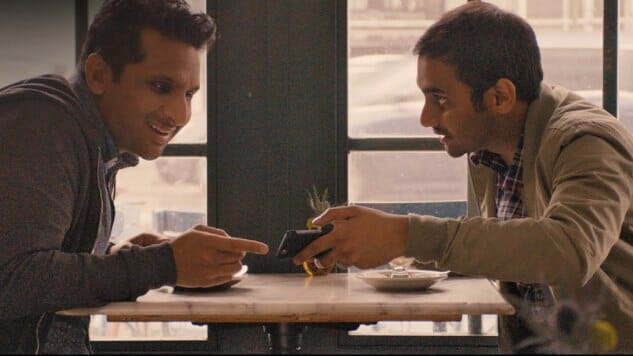Master of None: “Indians on TV” (1.04)

Like “Hot Ticket” and many other episodes of Master of None, “Indians on TV” has roots in Aziz Ansari’s stand-up. Way back in Intimate Moments for a Sensual Evening he joked about the pervasiveness of white people in the media (“Are white people just psyched all the time?” he asked, after listing off movies full of white people, a.k.a. most movies). Suffice it to say, the underrepresentation of minorities in film and television has been on Ansari’s brain for quite some time.
Where “Indians on TV” succeeds is in transforming this insightful stand-up material into a cohesive half-hour of television. “Hot Ticket” was a half-hour that felt designed to prove a thesis we already know: modern dating is annoying as hell. “Indians on TV” starts with a thesis—Indians are underrepresented and rampantly stereotyped in the media—and then uses its runtime to explore it with an unprecedented level of nuance, all without sacrificing comedy in the process.
It’s the sort of work that Aziz Ansari and Alan Yang were uniquely positioned to produce in this particular cultural moment. They didn’t have to make this, but they did, and the end product is both culturally significant and hilarious.
“Indians on TV” opens with a montage of Indian representation in the media that hits all of the major and most depressing beats: Fisher Stevens’ brownface in Short Circuit 2, Apu in The Simpsons, the abysmal Love Guru, and, of course, Ashton Kutcher’s 2012 Popchips ads, in which he played a Bollywood producer named Raj who is “looking for the most delicious thing on the planet.”
Creatively, it might seem a little heavy-handed to open with this montage but it’s a necessary orientation for the episode. Members of minorities tend to be finely attuned to their own media representation in ways that people outside of those minorities would never notice. Sure, other people might have a general sense that the way in which Indians are depicted is not great but Aziz Ansari has spent an entire lifetime noticing—and feeling constricted by—media portrayals. The abrupt format switch is out of step with the rest of the series but it transports us directly into Ansari’s thought process in medias res and allows the episode to proceed without the burden of having to prove how bad things really are.
The story of “Indians on TV” revolves around Dev and his friend Ravi’s auditions for a sitcom called Three Buddies, and how they handle an intercepted e-mail from an executive who says that the network should meet with both and see which actor “curries our favor,” because “there can’t be two.” Should they leak it? Should Dev use it as leverage to get on the show or would that make him, in Ravi’s words, an “Uncle Taj”?
-

-

-

-

-

-

-

-

-

-

-

-

-

-

-

-

-

-

-

-

-

-

-

-

-

-

-

-

-

-

-

-

-

-

-

-

-

-

-

-








































